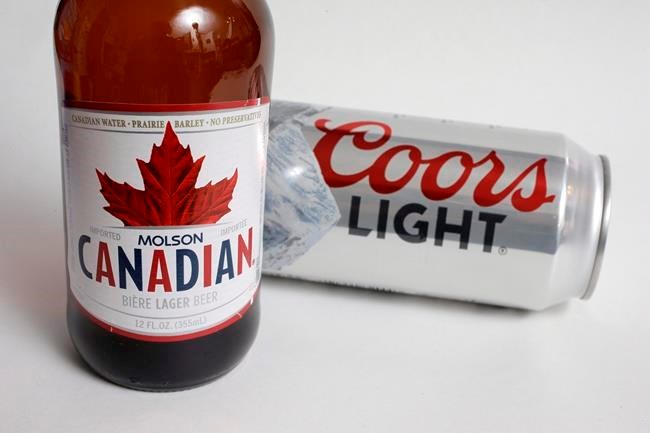MONTREAL — Molson Coors Beverage Co. recorded a lacklustre third-quarter as ongoing COVID-19 restrictions and packaging material constraints curbed the brewing giant's sales.
The Montreal-based company, which reports in U.S. dollars, said Thursday it recorded net sales of US$2.75 billion for the three months ended Sept. 30, down 3.1 per cent compared with US$2.84 billion for the same quarter last year.
Molson Coors chief executive Gavin Hattersley said the pandemic has presented obstacles for the brewer.
"Like all other beverage companies, one of the biggest challenges this year has been packaging supply," Hattersley said during a conference call with analysts.
"To put into perspective the scope of the challenges, we sold 300 million more cans of beer in the first nine months of 2020 than we did in same period in 2019."
He added: "There have been times over the last few months when demand for tall cans was four times what it was in 2019."
But Hattersley said there has been a steady improvement in supply over the last several weeks.
He said the supply of 12-ounce industry standard cans is stabilizing, and the company is starting to improve its inventory of tall cans as well.
Meanwhile, the company said Coors Light and Miller Lite grew six per cent and 9.5 per cent, respectively, in off-premise sales in the U.S. so far this year.
The combined U.S. segment share for Coors Light and Miller Lite has grown for 24 consecutive quarters — six straight years, according to data and market firm Nielsen.
Molson Coors' said its so-called above-premium products made up a record portion of the company's U.S. portfolio in the third quarter.
The brewer's light citrus wheat beer Blue Moon LightSky was listed as the top selling new beer in the U.S. in 2020, according to Nielsen.
The company also recently launched Coors Seltzer at the end of August and sold over 500,000 cases in the first month.
Meanwhile, in a bid to expand beyond the beer aisle, the company has broken into the cannabis beverage market in Canada.
Molson Coors said Truss, its Canadian cannabis joint venture, has become a market share leader of ready-to-drink cannabis beverages, with an estimated market share of over 50 per cent in Quebec.
The Company also launched Vyne Botanicals hop water in Canada.
Last October, the company announced a revitalization plan with the aim of strengthening its core brands, growing above-premium brands and expanding "beyond the beer aisle."
Hattersley acknowledged there are questions about the complexity of the company's revitalization plan, expansion of products and ability to execute the goals.
But he said the company is already making progress and seeing improvements in both core products and newer brands.
He said retailers are "hungry" for innovation, while 80 per cent of its distributors already carry non-alcohol products and half carry wine and spirits.
"They're actually ahead of us," Hattersley said. "We're playing catch up with them."
From a supply chain perspective, he said the new products are not going through the company's breweries and Molson Coors is expanding its warehouse capacity.
Still, Hattersley said the can shortage during the pandemic forced the company to make some decisions around slow-moving brands and stock keeping units.
"I would expect some of those SKUS won't come back, so from a complexity point of view from a brewery point of view I would expect that we will have less SKUS when we come out of this pandemic than we did coming into the pandemic," he said.
Molson Coors said it earned net income of $342.8 million or $1.58 per diluted share for the quarter compared with a net loss of $402.8 million or $1.86 per diluted share a year ago when it took a large goodwill impairment charge.
The brewer said its underlying net income for the third quarter was $350.8 million, or $1.62 cents per diluted share, compared with an underlying profit of $321.2 million, or $1.48 per share, in the third quarter of 2019.
This report by The Canadian Press was first published Oct. 29, 2020.
Companies in this story: (TSX:TPX.B)
The Canadian Press




